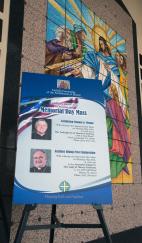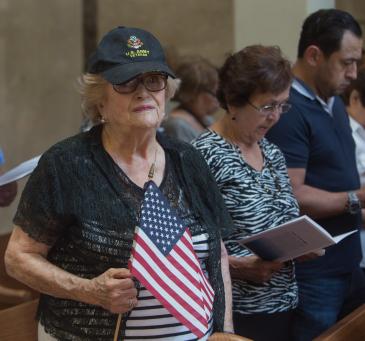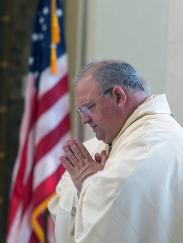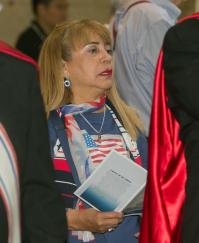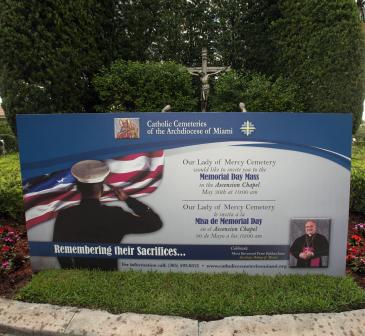By Bishop Peter Baldacchino -
Photography: Marlene Quaroni| FC
Auxiliary Bishop Peter Baldacchino preached this homily May 30, during a Memorial Day Mass at Our Lady of Mercy Cemetery in Doral.
We gather today at Our Lady of Mercy Cemetery to celebrate the Holy Mass particularly for the souls of “the fallen” of all wars; it is an opportunity to renew the gratitude of the whole society to those who have given their lives while serving in our armed forces, praying for their eternal salvation.
Today we wish to entrust to the Lord especially those who have died during the past year.
We gather here to also renew our own commitment to world peace, the peace that in our times as much as in the past and in the future, must always be founded on truth, justice, love and freedom.
In the midst of the second world war, in the year 1942, Pope Pius the XII during a memorable speech provided profound content to a Latin phrase that, though taken from the Prophet Isaiah, has since become a well-known motto even outside its religious context: “Opus Justitiae Pax”, “The work of justice shall be peace.”
It is precisely upon these words I would like to spend some time before passing to the readings of today’s Mass.
The Catholic Church strives at every level to create peace; and the Lord Jesus encourages all of us to be part of this effort: “Blessed are the peacemakers” is an ever-present appeal, which applies to every generation. Note that it does not say "Blessed are the preachers of peace." No! Jesus says: "Blessed are the peacemakers," that is to say, those who make peace. Making peace is a work that requires passion, patience, experience, tenacity. Blessed are those who sow peace with their daily actions, attitudes and acts of service, fraternity, dialogue, mercy.
But, as I was mentioning earlier, peace is the fruit of justice, and history clearly reminds us about this truth. In effect, we are rapidly becoming a society that is incapable of remembering history; a society that is severed from its roots; a society that is detached from the lessons that our ancestors had learned.
But history teaches us that peace, rights, and justice are inseparably inter-connected. When the law is destroyed, when injustice comes to power, then peace is always threatened and is already--at least in part-- compromised.
Pope Benedict, while speaking of World War II said that “the entire world had to intervene in order to break the circle of criminal actions that the unjust regime of the Nazis had brought to Europe, in order to re-affirm justice and right”.
History teaches us, and we must listen and pay attention to it.
Again, Benedict XVI reminds us that “Certainly the defense of the law can and must, in certain circumstances, use proportional force. Absolute pacifism, which denies the right to use any means of coercion, would be tantamount to capitulation to injustice, would sanction the seizure of power and abandon the world to the dictates of violence. But to prevent the force of law from turning into injustice, one must submit it to rigorous moral criteria, recognized as such by all.”
Even today there are many small and big wars taking place all over the world; there is the new world war declared by terrorism, a war without a fixed front, which can strike anywhere and which knows no distinction between combatants and civilians, between the guilty and the innocent.
The mission of the Church in this world, however, remains that of bringing peace to all, by working tirelessly to provide a solution to the many sources of injustice and hatred that still exist today.
However, in the absence of an absolute point of moral reference, human actions and efforts can be ineffective and indeed humanity faces the risk of remaining at the mercy of evil forces. The need to have an absolute moral criteria on which to build our actions and efforts encourages us to bring God and the values of morality and faith into the fight for the defense of other fellow men, of justice and of the law.
This means that we Christians must strive, together with all our fellow citizens, to give to law and justice a moral foundation, a foundation that is based on fundamental Christian values. To ensure that such an endeavor may really be effective, it is necessary however that we ourselves live our catholic faith with energy and purity, so that it becomes visible to all, and indeed effective; thereby transmitting its inner strength of persuasion to the overall society.
In this sense the first reading of today’s Mass comes to our help and gives us directions on how to proceed on this journey. St Peter tells us “For this very reason, make every effort to supplement your faith with virtue, and virtue with knowledge, knowledge with self-control, self-control with endurance, endurance with devotion, devotion with mutual affection, mutual affection with love.”
For the Apostle Peter, love is the end result--the ultimate goal-- of faith and virtue. A faith without virtue is simply an empty phrase, that could easily become deceiving, thereby becoming a source of condemning self-righteousness. Faith must lead to love; and love needs to be seen in action!
The Parable of the Tenants furthermore brings to our attention a very dramatic aspect of the reality of our life: It tells us that God has created us and placed us in a beautiful vineyard; the creative act of God starts a relationship that is full of grace, in which man is placed in front of his Creator, called to bear fruits of love and justice. But God leaves us to ourselves; …it seems that he disappears: "And he went away" says the parable. God leaves mankind free, free to willingly respond to His love.
But "when it was harvest time" God comes in search of some fruits. The fruits of our life are not only meant for ourselves! The life we have been given, for example, was given to us as a patrimony in order to bear fruit and not simply to be squandered. But what happens? Something inexplicable occurs: On the one hand, on the part of man, we find a progressive closing into oneself, and an ever greater hardening and disrespectful attitude towards the messengers who come in search of the fruits that ultimately belong to God: "One they beat, another they killed him, and stoned another."
On the part of God, we see a loving response to this kind of rejection, a love that is no longer able to contain itself: "He sent other servants – many others!" Eventually God makes the final attempt to save us: "They will respect my son." The word here tears open a little, the veil that covers the Mystery of the Incarnation of Jesus. The origin of this mystery is the Father's love for man: He so loved the world that he sent His only begotten Son.
This is the ultimate manifestation of his love, in the hope that mankind -- in all freedom-- may finally entrust himself to God.
Yet even here man answers with another refusal: “Let us kill him, so that his legacy will be ours." Christ, the supreme revelation of absolute love, is perceived as a competitor, actually as an enemy that wants to take away what we have wrongly believed is ours.
At this point then, an unexpected "turn of events" happens. Listen to this: "The stone the builders rejected has become the cornerstone" announces Jesus. What does this mean? It means that precisely from the death of Jesus, the rejected cornerstone, a crucified man, comes forth the source our life. On the cross, the two realities have clashed: the Love that gives itself and the freedom that kills the other.
What the parable tells us is ultimately the story of humanity. It is the history of Israel; it is the story of each and every one of us: it is the history of our freedom that must still come to terms with the Love of God as revealed in the crucified one.
Since the death and resurrection of the Lord has not been the end, physical death is no longer the last word for those who are “in Christ,” because man is destined to a life without limits, eternal, a life which has its roots and its fulfillment in God.
Let us all become builders of justice, of peace, of the fruits that our God wants us to provide him and for which, ultimately, he has created us; and in this way let us honor and remember the sacrifice of all those who fought to achieve them. May God bless us.

